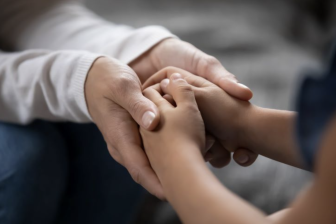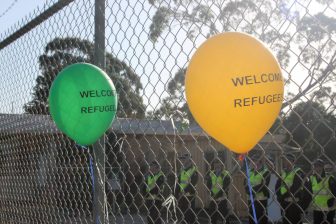
Homeless refugee children in Greece find new lives across Europe
Legislative changes in Greece and a relocation programme have helped hundreds of unaccompanied refugee children get off the streets.
‘Abed’ was just 11 years old when he left his parents and siblings in Iran and began the long and dangerous journey to Europe.
His family had fled to Iran from Afghanistan, their homeland, but they lacked residence permits and lived in constant fear of deportation. Without documentation, they could not access basic services like education for Abed and his siblings, writes Louise Donovan of the UN Refugee Agency (UNHCR).
Initially, he travelled with an uncle. They walked after nightfall, and at one point were forced to run for their lives to escape gunfire and imprisonment. When they finally arrived in Turkey, they spent months living in cramped conditions at the behest of smugglers.
It took four attempts to successfully cross the Aegean from Turkey to Greece. “We had to take a boat from Turkey with 40 people,” recalls Abed. “It was so scary.”
Abed finally arrived on the island of Lesvos in 2019. At this point, his uncle left him to fend for himself and he became one of more than 1,000 unaccompanied asylum-seeking children in Greece at the time who were either homeless or living alone in precarious conditions in camps.
Unregistered and outside of the official system, many picked fruit or sold counterfeit cigarettes to survive. Others suffered from sexual exploitation or other forms of abuse, while many were detained by the authorities.
At the end of 2020, following sustained advocacy by the UN Refugee Agency, UNHCR, the Greek government brought in a new law that ended the detention of unaccompanied children on the sole grounds that they are homeless. This was followed in January of this year by the introduction of an Emergency Response Mechanism that offers support and a safety net for the children. The majority of them are now staying in official shelters.
After around two months on Lesvos, Abed left for the Greek mainland where he ended up living alone and unregistered in a makeshift tent at a camp in northern Greece. After several months, an NGO found him there and referred him to UNHCR which carried out an assessment of his needs at the end of 2020 and recommended him for relocation.
‘Many were detained by the authorities’
Voluntary relocation is a tool for helping countries like Greece cope with the arrival of large numbers of asylum seekers by transferring some of them to other states willing to share responsibility. The current programme, established in Spring 2020, is led by the Greek Ministry for Migration and Asylum, and supported with funding from the European Union. Through collaboration between UNHCR, partner NGOs, the European Asylum Support Office (EASO), as well as IOM and UNICEF, it aims to relocate some 5,200 vulnerable asylum seekers and refugees, including up to 1,600 unaccompanied children, as well as children with medical conditions and their family members.
As of the end of November, more than 4,480 people have been relocated from Greece to 14 European countries, including over 1,065 unaccompanied children.
“Without the relocation programme, all of the other improvements [for unaccompanied children] would not have been feasible,” says Irene Agapidaki, Special Secretary for the Protection of Unaccompanied Minors in Greece. “It is an integral part of the child protection ecosystem in frontline countries. Before, we had around 5,500 unaccompanied minors and it was a huge challenge.”
UNHCR has worked hard to ensure that homeless children are amongst those included in the relocation programme and dozens of them have already been relocated to European countries.
At the end of July, more than two years after leaving his family, Abed, now 13, touched down in Dublin, Ireland.
“When they told me I’d be moving to Ireland, I didn’t believe it. I thought they were lying, it was wonderful,” he says. He was welcomed at the airport by social workers from TUSLA, the Irish State Child and Family Agency. TULSA’s Principal Social Worker, Thomas Dunning, is now working to ensure his smooth transition into his new life in Ireland.
“I go to school every day … I have my own bedroom!”
“Because of Abed’s vulnerabilities, we recommended he go initially to a children’s home, where he can receive 24-hour care and attention and the integration support he needs before he is placed with a family,” he explains. “I go to school every day, I have good food, I have good social workers, I have my own bedroom!” says Abed.
He will soon be joined by two friends – two other unaccompanied children he shared a room with for a short time while in Greece.
While significant progress has been made in Greece towards addressing the plight of unaccompanied refugee children, Theodora Tsovili, a child protection officer with UNHCR, noted that the relocation programme remains an ad-hoc government scheme which depends on the political will of other EU Member States.
“UNHCR is advocating with Member States to offer more relocation opportunities through multi-year programmes with regular funding, which will continue to benefit the most vulnerable unaccompanied children,” she said.
Once Abed receives his official refugee status in Ireland, he can apply for his family to join him, although family reunification is a lengthy and complicated process. In October, UNHCR called on States to expedite family reunification procedures for Afghan refugees such as Abed due to the deteriorating humanitarian situation in Afghanistan.
For now, he is looking forward to the arrival of his friends.
“I don’t think about the future too much. It would be really good if my family could come…and I want to play volleyball!” he adds.
Original text: UNHCR.
*Name has been changed for protection reasons




